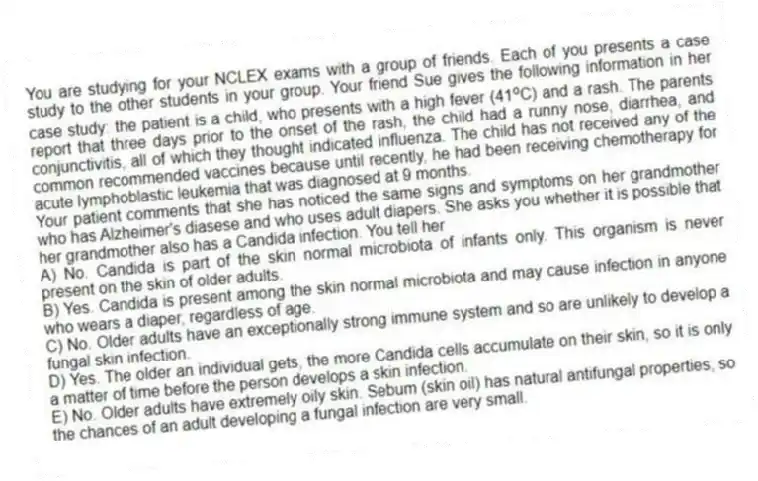
You are studying for your NCLEX exams with a group of friends. Each of you presents a case study to the other students in your group. Your friend Sue gives the following information in her case study: the patient is a child, who presents with a high fever (41oC) and a rash. The parents report that three days prior to the onset of the rash, the child had a runny nose, diarrhea, and conjunctivitis, all of which they thought indicated influenza. The child has not received any of the common recommended vaccines because until recently, he had been receiving chemotherapy for acute lymphoblastic leukemia that was diagnosed at 9 months.
-Your patient comments that she has noticed the same signs and symptoms on her grandmother who has Alzheimer's diasese and who uses adult diapers. She asks you whether it is possible that her grandmother also has a Candida infection. You tell her
A) No. Candida is part of the skin normal microbiota of infants only. This organism is never present on the skin of older adults.
B) Yes. Candida is present among the skin normal microbiota and may cause infection in anyone who wears a diaper, regardless of age.
C) No. Older adults have an exceptionally strong immune system and so are unlikely to develop a fungal skin infection.
D) Yes. The older an individual gets, the more Candida cells accumulate on their skin, so it is only a matter of time before the person develops a skin infection.
E) No. Older adults have extremely oily skin. Sebum (skin oil) has natural antifungal properties, so the chances of an adult developing a fungal infection are very small.
Correct Answer:
Verified
Q80: Which of the following statements regarding S.
Q81: A young mother brings her three-month old
Q82: A young mother brings her three-month old
Q83: A young mother brings her three-month old
Q84: Does rubella always lead to congenital rubella
Q86: You are studying for your NCLEX exams
Q87: Why would a non-immune pregnant woman not
Q88: Confirmation of the rubeola diagnosis can by
Q89: Rubeola can be effectively prevented with the
Q90: The rubeola virus damages the respiratory mucous
Unlock this Answer For Free Now!
View this answer and more for free by performing one of the following actions

Scan the QR code to install the App and get 2 free unlocks

Unlock quizzes for free by uploading documents